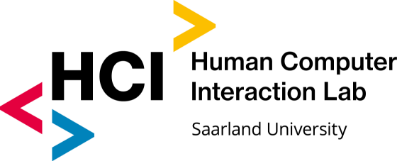Advanced lecture Physical Computing / Winter semester 2016/17
Learning By Doing
As an advanced lecture, this course was designed to be open-ended and allowed for ideation and experimentation. Some of the successful projects resulting from this course ( Interactive Jacket for Cyclists , Ambient Flower , Sprinter , Interactive Dancing Socks ) have been featured on Instructables website garnering a number of views.
| Type | Advanced Lecture (6CP) | |
| Time | Wednesday, 10:15-11:45 AM (lecture) Monday, 14:15-15:45 PM (exercises) |
|
| Place | Bld. E1.7 (MMCI), Room 001 | |
| Language | English | |
| Links | Course moodle, LSF |
Description
The goal of this course is to acquire basic conceptual and practical skills in developing physical user interfaces for interactive devices and objects. These user interfaces extend interaction beyond a screen and leverage the benefits of physical interaction in the real-world. Examples comprise wearable fitness trackers, interactive furniture, or computer-augmented lego bricks for children.
Students will learn about the conceptual basics of physical user interfaces. They will learn how to use microcontrollers, sensors, and actuators to make objects and devices interactive. They will learn what methods and techniques exist for prototyping of physical user interfaces and learn to apply them in the user-centered design process.
- Conceptual basics of physical user interfaces: Ubiquitous computing, tangible interaction, embodied interaction
- Basic Electronics
- Microcontrollers (Arduino)
- Sensors (e.g., touch, temperature, light, motion) and actuators (e.g., motors and servos)
- Prototyping and digital fabrication (3D printing, milling and cutting)
- Wearable user interfaces and Interactive skin
Exercises
In the exercises, students will work on a practical project in a team. In the project, you will gain practical experience with sensors, actuators, and digital fabrication by developing a physical computing user interface. We will present a list of topics in the first week.
The exercises will also involve three reading assignments, done individually by each student. For every assignment, you will have to read one or more research papers and hand in a written report that discusses these papers. Reports should summarise the key aspects, and more importantly, should include original and critical thought that show you have acquired a meta level understanding of the topic.
Registration
Please note that because of the close individual supervision the number of participants is limited to 20!
Please register by sending an e-mail to physcomp16@cs.uni-saarland.de not later than October 19, 2016. Places will be provided in the order of registration until all places are taken. Note that you will have to register on HISPOS later during the semester for participation in the final exam.
Grading and Exam
50% of your grade will be based on the final exam. The remaining 50% is based on the exercises (project and reading assignments). You need to pass the final exam as well as the exercises.
The final exam will be written or (more likely) oral, depending on the number of participants. The final exam will cover all the material discussed in the lectures and the topics of your assignments. The final exams are scheduled for the last week of the semester (Feb 13-17, 2017). Dates of the re-exam will be announced during the semester.
Literature and Materials
Lecture slides will be made available on moodle. All reading will be made available during the lecture.
People
Lecturer
Prof. Dr. Jürgen Steimle
Organization
Aditya Shekhar Nittala, MSc.


